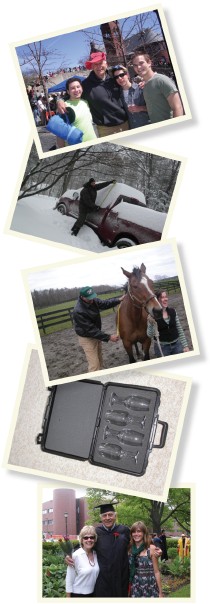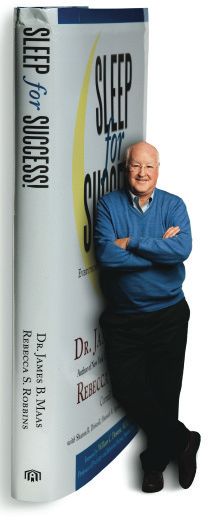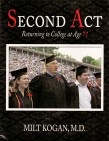BOOKS
Sleep evangelist Maas and Kogan of 'Barney Miller' are now self-publishers
James Maas, Cornell professor of psychology, and actor/physician Milt Kogan '07 have a lot in common: They're both Cornellians in their early 70s, have been on TV many times and have each just self-published a nonfiction book with AuthorHouse that relates to Cornell in various ways.
Maas' book, "Sleep for Success! Everything You Must Know About Sleep but Are Too Tired to Ask," written with Cornell graduate student Rebecca S. Robbins '09 while she was an undergraduate (and with significant help from Sharon Driscoll '12 while she was a sophomore; Hannah Appelbaum '06, now in social work school at Emory University; and Samantha Platt '10, now in physician assistant school). It presents the latest scientific research on sleep, much of it conducted in Maas' Cornell sleep lab, where he recently studied the sleeping patterns of 450 students.
Kogan's "Second Act: Returning to College at Age 71" is a "diary" of the 2007 semester the physician spent at Cornell to complete his bachelor's degree. Kogan had been practicing medicine for more than 40 years and performed in some 200 TV shows (he was Officer Kogan on the sitcom "Barney Miller") and various movies when he took his wife's challenge to complete the Cornell degree he never finished, because he entered medical school in 1956 right after his junior year.
Why self-publish?
Maas' previous book, "Power Sleep: The Revolutionary Program That Prepares Your Mind for Peak Performance" (HarperCollins, 1998), was a New York Times best-seller translated into 10 languages. When HarperCollins said it would only consider publishing the new book as a revised edition of "Power Sleep," Maas balked: "This is a major new look at the field 12 years later."
It was May 2010, and to hunt for another publisher and get the book published would take up to year. "I wanted the public and my students to have access to the latest information" by the fall, says Maas. He also wanted a new book for myriad how-to-sleep-better presentations he and his writing assistants give as part of Maas and Robbins' consulting firm, Sleep for Success, to Fortune 500 companies and such groups as the New York Jets and Orlando Magic. "They ask for my book, and with 'Power Sleep' being so old, I just decided to bite the bullet."
Maas got the manuscript to AuthorHouse in June. By Sept. 5, the book was on store shelves.
"It was expensive, but I didn't publish this to make money. I am preaching that we have to learn the value of sleep; it's a necessity, not a luxury – that's how I am spending the rest of my life," says Maas, who's been called a "sleep evangelist" in the media.
The book notes that 65 percent of Americans are sleep deprived. But just one extra hour of sleep per night can greatly improve a person's mood, alertness, health and productivity.

Images from Milt Kogan's book "Second Act" include, from top: Kogan with classmates at Slope Day 2007; during an Ithaca snowstorm; measuring a horse during an equine lab; enology class supply case; and a Kogan family photo at Commencement. See larger image
The book reports on such findings as:
- The best predictor of longevity is not exercise or nutrition, but quality and quantity of sleep;
- Most people overestimate the amount they sleep each night by nearly one hour;
- If you fall asleep within five minutes, you are sleep deprived, since the fully rested person takes 20 minutes to fall asleep;
- Women sleep less soundly with a partner than men do; perhaps that's why 23 percent of American couples sleep apart;
- Every additional hour of sleep reduces a child's risk of obesity by 9 percent;
- One drink of alcohol on six hours of sleep has the same effect on one's ability to drive a car as three to four martinis on eight hours of sleep;
- The best time to exercise is between 5 and 7 p.m. to enhance the depth of nighttime sleep.
Maas' recent studies on high school and college students support the idea that the teenage brain is set to fall asleep at 3 a.m. and wake up at 11 a.m., yet most high school and college students get 2.5 hours less sleep per night than recommended. Grades in high school and college are directly related to sleep length as evidenced by the increase in students' grades and other measures, Maas has found.
The book also includes tests to help readers determine how well they sleep, the financial and health costs of sleep loss, strategies for getting a healthy night's rest, sleep tips for different populations and for managing jetlag, and guidelines on sleep medications.
Maas, Ph.D. '66, has been teaching Psychology 101 at Cornell for 47 years, with an enrollment of 1,600 students some years, giving him the record for having taught more than 65,000 students in his Cornell career.
Kogan, on the other hand, self-published "Second Act" as a "memory to treasure" about his "exciting experience at Cornell at age 71" for friends, fellow students and perhaps even "grandchildren of the future to know the voice of their grandpa … and even possibly as a stimulus for other senior citizens," Kogan says. He knew writer friends and "their struggles with agents, publishing, rejection" and their lack of opportunity "to write down the experiences of their lives and to ponder them. … Anyway, who, in reality, would be interested in sponsoring a 71-year-old writer who remains only interested in writing about his own life?"
Kogan's book is a candid look at his academic insecurities, competing with students a half-century younger; his fears of a heart attack on Libe Slope; coping with blizzards and bitter cold; and the sheep and pig labs for his animal science course. It ends with his 50th Cornell Reunion (which he attended just one week after his graduation) and some advice.
As for his third act: Catch him in "Mulligan" on the Hallmark Channel in December and in "The Descendants," starring George Clooney, in 2011.

